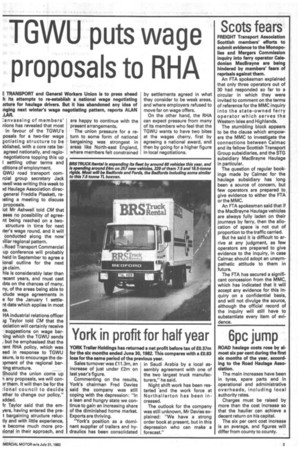TGWU puts wage proposals to RHA
Page 3

If you've noticed an error in this article please click here to report it so we can fix it.
E TRANSPORT and General Workers Union is to press ahead h its attempts to re-establish a national wage negotiating Wine for haulage drivers. But it has abandoned any idea of inging next winter's wage negotiating pattern, reports ALAN .LAR.
:anvassing of members' nions has revealed that most in favour of the TGWU's posals for a two-tier wage gotiating structure to be ablished, with a core rate beagreed nationally, and regionegotiations topping this up I settling other terms and iditions of employment.
GWU road transport cornrcial group secretary Jack swell was writing this week to id Haulage Association direcgeneral Freddie Plaskett, resting a meeting to discuss proposals.
lut Mr Ashwell told CM that sees no possibility of agreent being reached on a twostructure in time for next iter's wage round, and it will conducted along the now siliar regional pattern.
Road Transport Commercial up conference will probably held in September to agree a ional outline for the next ge claim.
his is considerably later than recent years, and must cast ibts on the chances of many, ny, of the areas being able to Iclude wage agreements in a for the January 1 settlent date which applies in most
BS.
HA industrial relations officer sg Taylor told CM that the ociation will certainly receive suggestions on wage barling which the TGWU sends , but he emphasised that the rent RHA policy, which was Bed in response to TGWU ssure, is to encourage the demment of the regional bar ling structure. _ Should the union come up any proposals, we will conar them. It will then be for the lional council to decide 3ther to change our policy," added.
ir Taylor said that the emyers, having entered the pret bargaining structure reluctly and with little experience, e become much more pro;lona! in their approach, and are happy to continue with the present arrangements.
The union pressure for a return to some form of national bargaining was strongest in areas like North-east England, where members felt constrained by settlements agreed in what they consider to be weak areas, and where employers refused to move far on wage offers.
On the other hand, the RHA can expect pressure from many of its members who feel that the TGWU wants to have two bites at the wages cherry, first by agreeing a national award, and then by going for a higher figure in local negotiations.










































